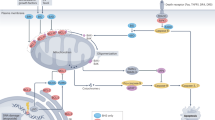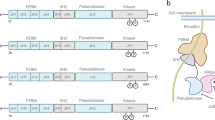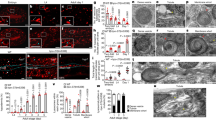Abstract
Members of both the mitogen activated protein (MAP) kinase and BCL2 gene families, acting in concert with other gene products, are involved in the regulation of cell viability. However, the relationship between these families, and the signal transduction networks that control viability-regulating genes, are only beginning to be elucidated. MCL1 is a viability-promoting member of the BCL2 family that exhibits a rapid increase in expression in response to specific differentiation- and apoptosis-inducing stimuli. The signal transduction pathway involved in eliciting this increase has now been investigated. In the ML-1 human myeloblastic leukemia cell line, a rapid and sustained increase in phosphorylation of the extracellular signal-regulated kinase (ERK) members of the MAP kinase family was found to precede the increase in MCL1 expression produced by 12-O-tetradecanoylphorbol 13-acetate (TPA) or the microtubule-disrupting agents colchicine and vinblastine. ERK activation was necessary for the increase in MCL1, as inhibition of the increase in ERK phosphorylation (with the inhibitor PD 98059) prevented the increase in MCL1 expression and caused rapid cell death by apoptosis. In addition, other agents that markedly increased ERK phosphorylation (lipopolysaccharide, okadaic acid) also increased MCL1 expression. In contrast, agents that did not have this marked effect did not increase MCL1. Upstream components in this ERK-mediated pathway were also identified, where the pathway was found to be stimulated by microtubule disruption acting through protein kinase C (PKC). These results indicate that expression of the MCL1 viability-enhancing gene is regulated through a cytoskeletal disruption-induced ERK-mediated signal transduction pathway. They therefore suggest a mechanism through which the cytoskeleton and MAP kinases can exert effects on cell viability.
This is a preview of subscription content, access via your institution
Access options
Subscribe to this journal
Receive 50 print issues and online access
$259.00 per year
only $5.18 per issue
Buy this article
- Purchase on Springer Link
- Instant access to full article PDF
Prices may be subject to local taxes which are calculated during checkout
Similar content being viewed by others
Author information
Authors and Affiliations
Rights and permissions
About this article
Cite this article
Townsend, K., Trusty, J., Traupman, M. et al. Expression of the antiapoptotic MCL1 gene product is regulated by a mitogen activated protein kinase-mediated pathway triggered through microtubule disruption and protein kinase C. Oncogene 17, 1223–1234 (1998). https://doi.org/10.1038/sj.onc.1202035
Received:
Revised:
Accepted:
Published:
Issue Date:
DOI: https://doi.org/10.1038/sj.onc.1202035
Keywords
This article is cited by
-
Mcl-1 mediates intrinsic resistance to RAF inhibitors in mutant BRAF papillary thyroid carcinoma
Cell Death Discovery (2024)
-
Apoptotic stress-induced FGF signalling promotes non-cell autonomous resistance to cell death
Nature Communications (2021)
-
Preclinical efficacy for a novel tyrosine kinase inhibitor, ArQule 531 against acute myeloid leukemia
Journal of Hematology & Oncology (2020)
-
Global analysis of differential gene expression related to long-term sperm storage in oviduct of Chinese Soft-Shelled Turtle Pelodiscus sinensis
Scientific Reports (2016)
-
ADAM10 overexpression confers resistance to doxorubicin-induced apoptosis in hepatocellular carcinoma
Tumor Biology (2012)



